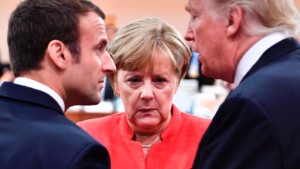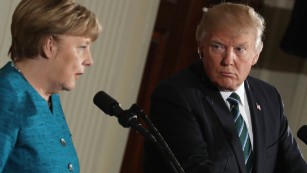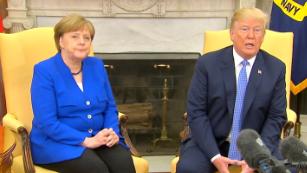Trump's NATO demands, explained
Washington (CNN)President Donald Trump has scaled up his demands on NATO allies ahead of a summit next week in Brussels, Belgium. And as he has since he was a candidate, Trump has mostly mischaracterized the spending issue in a way that casts European countries as freeloaders.
But even as his statements obscure the way NATO operates, the underlying matter remains one that his predecessors also confronted. And NATO's leaders have already assigned credit to Trump for across-the-board increases in defense spending, even as the number of members reaching the established goal remains small.
RELATED: Trump demands NATO spend more or face shifts in US military
Here is what you need to know about Trump's combative approach to the NATO alliance:
What is NATO?
Established in 1949, the North Atlantic Treaty Organization's charter says the signing parties will "seek to promote stability and well-being in the North Atlantic area" and will "unite their efforts for collective defense and for the preservation of peace and security." There are currently 29 NATO members. The group's headquarters is in Brussels, where leaders from the member states will gather on July 11 and 12 for a summit.
How is NATO funded?
NATO is underpinned by the principle of collective defense, meaning members are expected to keep their own militaries in fighting shape in case they are called on to defend an ally. In pursuit of that goal, members are expected to spend a certain amount for their own defense budgets. In 2006, NATO set an official target for members to spend on defense: 2% of their gross domestic product. That figure was reaffirmed during a summit in 2014. But the target is described only as a "guideline," and there is no penalty for not meeting it.
Europe fears it occupies a special place in 'Trump hell'
Member states also pay into NATO to cover common civilian and military costs, and no nation is behind on those payments. Instead, it is the defense spending issue that has caused the most contention between Trump and other members.
What will Trump say at the summit?
By all accounts, Trump is heading into next week's summit prepared to take leaders to task for not spending enough on defense. It's an issue he's focused on since he was a candidate, even as he's used misleading language to describe it. Trump has described allies as failing to pay their dues and owing back payments to NATO, when in reality the shortfalls come in the nations' own annual defense spending. No country is behind in payments to NATO.
Most recently, Trump bemoaned during a political rally that the US is "spending 90% of NATO," an imprecise claim that obscures how NATO actually operates. Total US defense spending amounts to about 70% of what all NATO members spend on defense, but not all of that US spending applies to NATO.
Why is Trump down on NATO?
Running for office, Trump routinely cast the US as being suckered into protecting and funding the rest of the world, often to the detriment of American workers and industries. His message resonated with white blue-collar workers, who saw their government helping other countries while leaving them behind. People close to Trump say he views NATO as just one example of the US protecting the world while getting little in return. He underscored that view during a political rally last month: "Now it's all wonderful and we like to help out. But it helps them -- they're in Europe! It helps them a lot more than it helps us. We're very far away!"
In reality, NATO's collective defense principle has been invoked only once, after the September 11, 2001, terrorist attacks on the United States. NATO helped lead anti-terror missions after the attack and eventually led the mission to rebuild Afghanistan's army after the US-led invasion of the country. The International Security Assistance Force included troops from all NATO members.
What has Trump told leaders?
In letters to NATO members sent last month, Trump has reinforced his demands. He wrote to German Chancellor Angela Merkel that "we need to find a way to overcome domestic hurdles in the interest of our collective security" and described his own political exposure in the matter: "I understand domestic political pressures against greater government expenditures as I also expended considerable political capital to increase America's defense spending."
NYT: Trump sent letters to NATO allies demanding increased defense spending
How is that different from past presidents?
Trump's immediate predecessors, Presidents Barack Obama and George W. Bush, pressed NATO allies to spend more on their militaries, but their approach was not as combative as Trump's.
"We've got to be willing to pay for the assets, the personnel, the training that's required to make sure that we have a credible NATO force and an effective deterrent force," Obama said at a 2014 news conference in Brussels shortly after Russia annexed Crimea, "So one of the things that I think, medium and long term, we'll have to examine is whether everybody is chipping in."
Unlike his predecessors, Trump raises the defense spending issue in nearly every conversation about NATO. And in his remarks and letters to world leaders, Trump has suggested that US commitment to NATO could be at stake if spending doesn't increase. Writing to Merkel, Trump warned that it would "become increasingly difficult to justify to American citizens why some countries do not share NATO's collective security burden while American soldiers continue to sacrifice their lives overseas or come home gravely wounded."
Is Trump's approach working?
NATO leaders say it is. "It is really having an impact because ... allies are now spending more on defense," Secretary-General Jens Stoltenberg said in May while he was visiting Trump at the White House. "All allies are increasing their defense budgets."
In March, Stoltenberg said alliance members had increased defense spending for the third straight year. But still, only a fraction of the alliance meets the 2%-of-GDP guideline. NATO said in March that only eight of the 29 member states would meet that threshold this year.
Trump's critics argue his tactics aren't helpful. They worry that in Europe, where the President is deeply unpopular, haranguing leaders to increase defense spending may have the opposite effect.
News Courtesy: www.cnn.com













